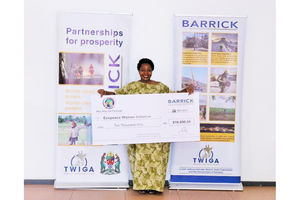Govt in new drive to promote tourism

Tourists admire animals at the Ngorongoro Conservation Area Authority in Arusha during their tour yesterday. PHOTO | FILBERT RWEYEMAMU
What you need to know:
The government’s decision is likely to ease small operators’ licensing burden besides increasing revenue and job opportunities
Dar es Salaam. The government has created a small tour operators category, a move which would help reduce statutory burdens and promote new businesses.
This might also lead to a sharp fall in fees that tourists are currently charged.
The strategy, which is in the process of being formed legally, has been offered incentives, which include lower licensing fees to make room for more operators.
The government’s decision is also expected to ease small operators’ licensing burden. They were charged a flat rate as the big companies.
Through new incentives, small tour operators who were paying a flat rate of $2000 (Sh4.5 million) per year as their big counterparts will now pay $500 (Sh1.1 million), which is a reduction of 75 per cent.
Tanzania is projected to attract two million tourists by 2020. This is expected to increase the sector’s contribution to the economy as well as rising inflow of foreign currencies.
An official from Tanzania Tour Operators Association believes this incentive will help to promote new investments, while existing small operators, with less than four vehicles will save cash due to low fees.
“What the government did was to create a small tour operator category, which we believe is a good move for the growth of the sector,” said the official, who sought anonymity.
Earlier this month, the ministry of tourism and natural resources unveiled new Tanzania Tourism Business Licensing (TTBL) fee structure intended to ease affordability for smaller local companies to operate, grow and compete.
Minister of Natural Resources and Tourism of Tanzania, Dr Hamis Kingwangalla said during the Boxing Day that the new fee structures would start from January, 2018. Previously, there was a fixed licensing fee structure for all local tour operators regardless of their fleet size. They were all required to pay $2000 per annum.
The small local operators have expressed their satisfaction with the government’s decision to reduce their statutory licensing fees, saying it will help those with little capital to grow.
“I am very happy with proposed fee structure. The previous fees were unfavourable for the small operators. We had to increase tour package fee to tourist in order to gain profit,” said Godfrey Moshi, an official from African Traits Ltd, one of the small local operators.
Mr Moshi added that the proposed fees will help the tourism sector to grow besides creating more job opportunities.
“I am confident that the new fee structure will help promote tourism and the government will certainly collect more revenue. The number of tourists, both local and foreign, will rise because it will be cheaper to visit various attractions,” said Moshi.
Apart from improving small local companies’ performance in the tourism industry, the decision was made to complement the current good record performance of tourism sector. According to the latest statistics, in 2016, the number of tourist arrivals reached 1,284,279, rising by 12.9 per cent from 1,137,182 in 2015.
The county’s tourism earnings rose by 12.1 per cent to $2,131.6 million in 2016 from $1,902.0 million in 2015, which is equivalent to 17.6 per cent of the country’s GDP.
In addition, tourism provides 600,000 direct jobs and one million indirect jobs.


